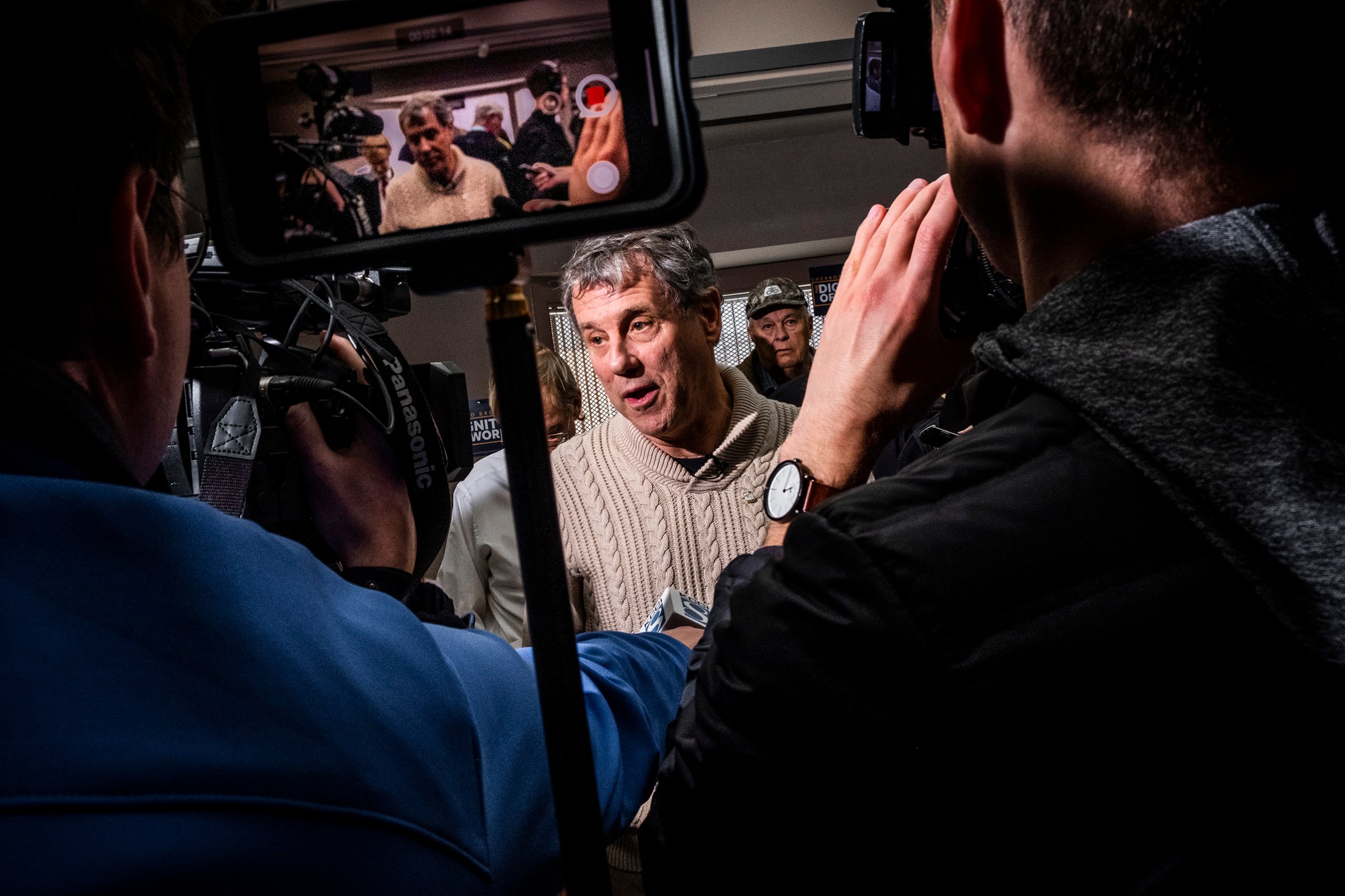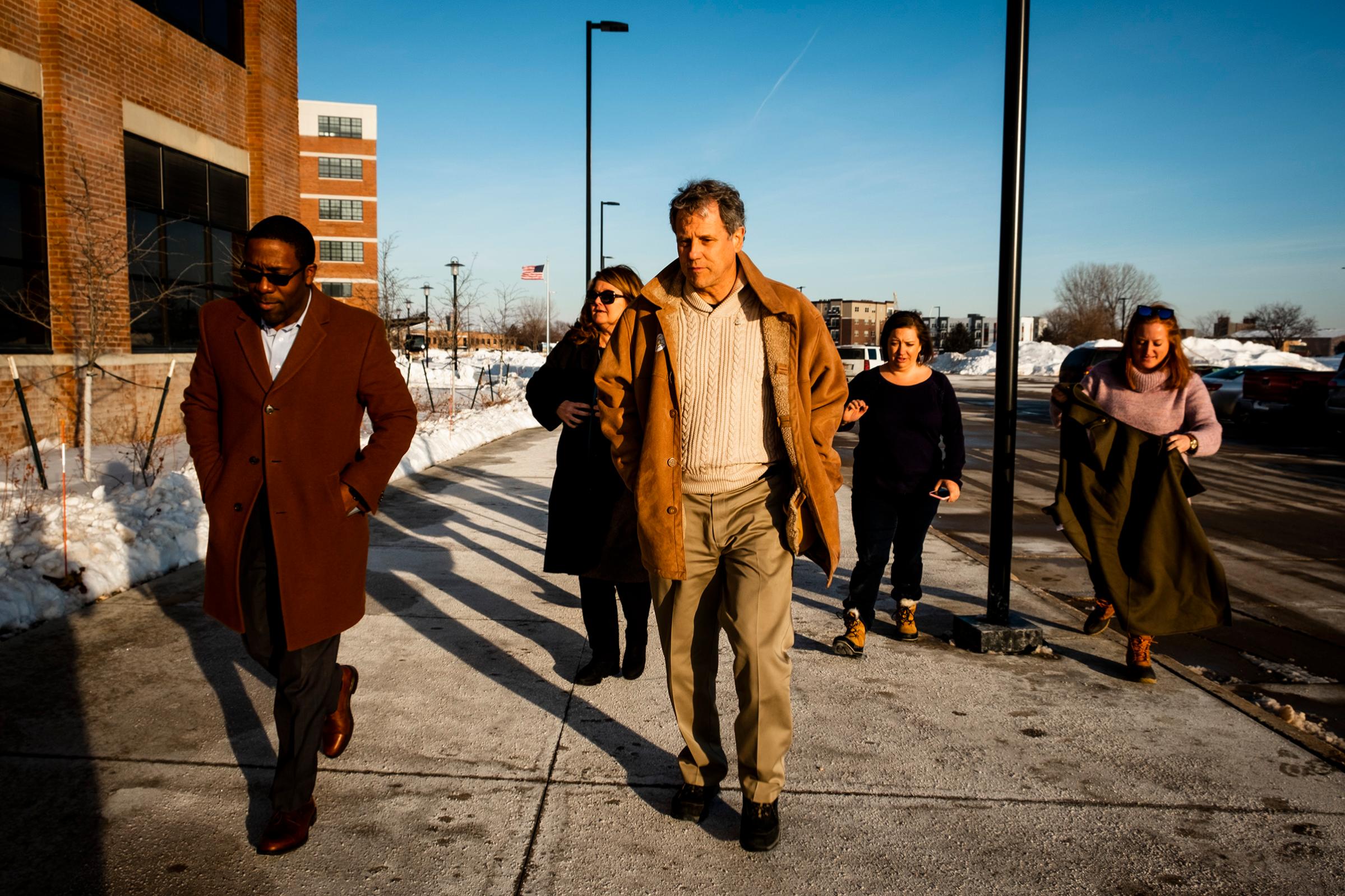
Sherrod Brown’s decision to forgo a bid for the White House is the first big surprise of the 2020 Democratic presidential primary.
The Ohio Democrat was taking all the necessary steps to assemble a competitive bid. Brown had enlisted a savvy veteran of Iowa as a campaign manager-in-waiting, tapped a star adviser to Hillary Clinton’s orbit to lead efforts in New Hampshire, and his plan to play up his working-class cred gave him a fighting chance in Nevada, where the culinary workers’ union reigns supreme. In pitches to activists and donors alike, Brown was preaching his ability to retake the Midwest.
In interviews he sounded every bit the contender, framing himself as a lifelong progressive who could get white, working-class voters to pull the lever for a Democrat. “I don’t have to show my progressive bona fides. I am who I am. But I’m also going to win the industrial Midwest,” he told TIME in January, riding in his Ohio-made Jeep from Cleveland to Lordstown, Ohio, for a January union-hall conversation with soon-to-be-out-of-work automakers. No President since John F. Kennedy has won the White House without carrying Ohio, which Brown did easily last year, the lone Democrat to win statewide. A Brown candidacy, he said, would expand the electorate in ways Clinton failed. Despite his meager early polling numbers, many Democrats saw him as a sleeper threat.
Which is why it was a shock March 7 when Brown announced he saw his seat in the Senate as the best way for him to continue battling on behalf of working people. “The best place for me to make that fight is in the United States Senate,” he said in a statement.

Ultimately, Brown concluded his path was too narrow to be viable. Much of the Democratic base has its eyes on the history-shattering candidacies of Elizabeth Warren, Amy Klobuchar or Kamala Harris. Others are thrilled by the likes of social-media darlings Cory Booker and Beto O’Rourke. All signs point to former Vice President Joe Biden jumping in the race in short order. The gruff, plain-spoken Brown had a tough path to match would-have-been rivals’ charisma. While he may have offered Democrats their best shot at a Midwest revival that is desperately needed should the party stand a chance at the White House, he was unlikely to survive a crowded primary, one adviser told TIME.
On top of the political questions, Brown had personal concerns. He consistently came back to the toll it could take on his family, especially his wife, the Pulitzer-Prize winning journalist Connie Schultz. As Brown weighed a campaign, a Republican research firm filed a public-records request of her emails at Kent State University, where Schultz teaches journalism. If Brown were to run, it was unlikely Schultz would have been able to continue write her syndicated column.
For her part, Schultz was game for the race if it meant booting Trump. “Our number-one goal must be to defeat Donald Trump. He is such as dangerous man,” Schultz told TIME earlier this year. But she noted a campaign would come with costs. “He really wants to be the best Senator he can be. If you run for President, you’ve got to make some choices.”
In recent weeks, Brown—the 66-year-old son of a Republican doctor and a Democratic activist—had grown increasingly frustrated with reporters asking him to weigh in on topics that weren’t on his agenda. For instance, during one February session with reporters in Washington, the conversation kept coming back to an environmental proposal offered by Rep. Alexandria Ocasio-Cortez. “I want to get something done now,” he told a breakfast organized by the Christian Science Monitor. “I don’t need to co-sponsor every bill that others think they need to co-sponsor to show my progressive politics.”
Despite the hints of trepidation, the decision still came as a surprise. Brown had spent the last few weeks visiting early-nominating states, including South Carolina this past weekend. He drew curious crowds for his conversations with voters and caucus-goers about what he described as “the dignity of work,” a line borrowed from the Rev. Dr. Martin Luther King Jr. Local party bosses were on hand to offer encouragement and to answer questions about idiosyncrasies of the early states. His financial supporters had a first wave of donations at the ready. All signs pointed to a launch this month. During his preliminary travel, advisers said, Brown heard strong encouragement. But, as his wife liked to remind him, the same people say the same thing when the next candidate comes to town.
Even though he won’t be on the ballot, Brown could still be a major figure in the 2020 race. Ohio’s politics are tricky, and there are few in the Democratic Party who have so successfully navigated its intricacies. Only once since 1974 has Brown lost a race in Ohio. The failure of the blue firewall in Ohio in 2016 was a warning sign more broadly. If Trump was breaking through there, what was happening in places like Michigan’s Genesee and Wayne Counties, or Kenosha County in Wisconsin—areas that saw sharp drop-offs in performance from Barack Obama in 2012 to Hillary Clinton in 2016.

With a finely tuned populist message, Democrats may be able to pierce Trump’s rhetoric there. While Trump claims the economy is roaring, the industrial Midwest could prove his biggest vulnerability. Just a day before Brown bowed out of a race he hadn’t yet joined, General Motors shuttered its final production plant in Ohio, a facility in Lordstown. Just 18 months ago, 5,000 people were working there on 6.2 million square feet of factory floor. Another 75 factories in Ohio supplied parts for the plant.
Brown’s thesis is one that other Democrats are studying. It’s why, when they ran into each other last weekend in South Carolina, Booker made a point of listening to his Senate colleague’s pitch. It’s one Brown has been making for months, including a day TIME tagged along with him during an Ohio blizzard. “National Democrats really see elections as you choose between the progressive base and working-class voters,” Brown said, with the low hum of the Beatles playing in the background. “You don’t win Ohio, you don’t win the Heartland, you don’t win the Electoral College by making the choice. You win by talking to both groups.”
Yet for all his convictions about how to win the presidency, he couldn’t bring himself to try. From his first run for the Ohio Legislature as a fresh-faced Yale graduate, Brown has made little effort to conceal his disdain for the frivolity of politics. Even as he weighed a campaign, he downplayed the suggestions he run.
“If you’re a sentient human being and you’re fairly high ranked in office, House or Senate. and you don’t drool when you speak, someone will come up and say, ‘You should be President,’” Brown told TIME in January. “I’ve heard that all my life. … But I never really thought, ‘I want to run for President.’”
Ultimately, he decided he did not. At least not under these conditions.
More Must-Reads from TIME
- Introducing the 2024 TIME100 Next
- The Reinvention of J.D. Vance
- How to Survive Election Season Without Losing Your Mind
- Welcome to the Golden Age of Scams
- Did the Pandemic Break Our Brains?
- The Many Lives of Jack Antonoff
- 33 True Crime Documentaries That Shaped the Genre
- Why Gut Health Issues Are More Common in Women
Write to Philip Elliott at philip.elliott@time.com